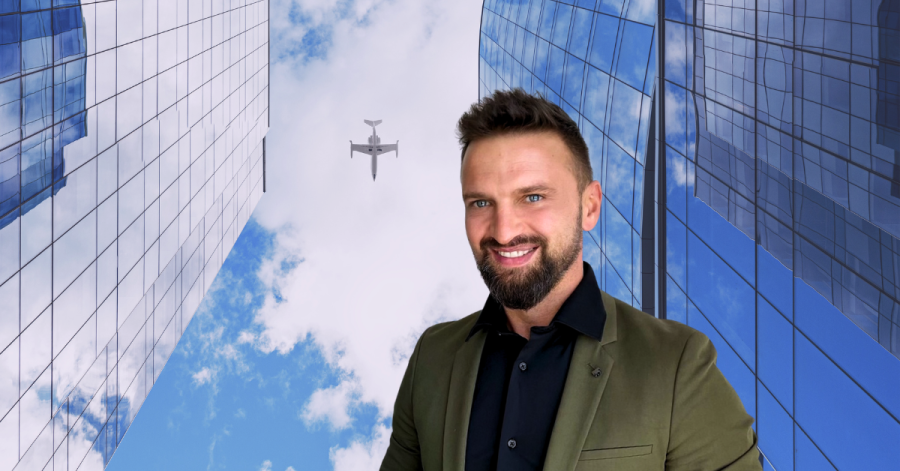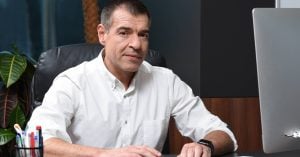Identifying a gap in corporate business travel, a Polish team has unlocked the potential of artificial intelligence and automation on the travel tech innovation wave. WorkTrips, formerly known as Hotailors, is a Warsaw-based AI-powered travel management platform for corporate business travel in Europe with an increasing presence in the Middle East and expanding to other markets, including the US.
Established in 2016 by Filip Bloch, Maciej Stopierzynski, and Michal Szeksztello, WorkTrips empowers corporates’ business travel reporting, integrations, and real-time analytics, allowing them to easily control their travel policy, reduce spending and increase efficiency. Today, the WorkTrips team consists of nearly 90 people and presents its clients with access to real-time offers of over 2.5 million hotels, 1500+ airlines, buses, trains, insurance, and 24/7 support.
The co-founder of WorkTrips, Filip Bloch, is a serial entrepreneur and travel expert with a background in hospitality management and cognitive psychology. Prior to founding WorkTrips, Filip established several businesses, including an FMCG distribution company Pol-Fil Bavaria, and acted as a managing director at a Baroque hotel Palace Popowo.
The Recursive sat down with Filip to dive into the topics of his entrepreneurial journey at WorkTrips, key successes and challenges experienced when scaling the business, and the role of AI in the future of the travel industry.
The Recursive: Can you describe a significant milestone or turning point in your entrepreneurial journey that led you to found WorkTrips?
Filip Bloch: I’m a serial entrepreneur. I’ve found a couple of businesses before, and WorkTrips, previously known as Hotailors, is my sixth business.
At one point in my career, a member of my family was diagnosed with autism spectrum disorder, and I realized that maybe one day, I would need to make their life more comfortable because they would not be able to manage that themselves. I decided this was a time to push force and accelerate the button because it was my duty, right? So a crucial part of my inspiration was internal motivation.
Also, I met the right people along the way. Before founding WorkTrips, we managed travel bookings for events, exhibitions, and summits. One of our USPs was finding the right hotel and personalizing the trip for individual clients, which took a lot of manual work. Due to the information available online, we researched that one of our clients had been seeking a particular book for some time, so when we found out the selected hotel had the book in its library, we had it added to his room.
The client, who was also a founder of a Slovenian accelerator, was so impressed he asked for a meeting with me and suggested we join his accelerator in Ljubljana. This was a turning point that helped us develop our business approach, design a solution based on clients’ feedback, and meet the right people. We’ve been fortunate that our first corporate client was Google with their Google developer experts who travel for large events. And these 1000 users were the first corporate users we had.
What do you consider are the key factors that have led to your startup’s success in the travel tech market?
Filip Bloch: My internal motivation, people, and technology were the key factors, I believe. With the already accessible technology, I focused on creating something that was a bit to the future. And the timing was actually perfect, and we started with the right approach from the beginning.
We are a tech company, so a big part of our team is in engineering quality assurance. My co-founder is a tech guy who used to run his successful software house that we merged and acquired in 2017. This is a core of our development team at WorkTrips. So imagine the people that have built the first line of code are still working in the company in vital positions. We have minimal turnover among employees, and this is amazing. The organization’s spirit and culture are very important to us and our people. We are also very hands-on within the company as founders. So most of the top deals signed by WorkTrips have been delivered directly by us.
One of the things that differentiates us is that we have been primarily bootstrapped in the past. We are also fortunate to have our R&D department based in Poland, as Poland has truly top-notch developers that have been growing their skills with us for the past seven years. There have been many layoffs within our competition over the last few years, so the situation allowed us to onboard highly skilled people for this project.
What were some of the biggest challenges you faced when starting WorkTrips and along the way?
Filip Bloch: Being based in Central Eastern Europe, funding and finding the right investors has been challenging, especially considering how much our industry has been affected due to the pandemic.
As I said, we choose a way of primarily bootstrapping. So, my role within the company was to provide security in the funding for our further growth. The challenge is still with us. We’re still moving forward, trying to find the best solution, change the existing one, or develop a more efficient one. I believe the constant drive made our company more solid and stronger. We’ve also been lucky or fortunate to win a list of various competitions, prizes, and grants over the seven years of this project, which allowed us to grow further.
How has the implementation of AI positioned you in the travel tech market? What benefits does it bring to you and your customers?
Filip Bloch: We’ve been trying to simplify operations and personalize our services with automation and machine learning from the beginning. Personalization was the foundation of this project from the very bottom line, just like the story with the book I mentioned.
We implement a list of automation allowing us, for example, to deliver a personalized offer to clients within seconds instead of like 30 minutes, which was the case in 2016. Our automated operations also enable personalization based on global situations and events, the needs of an individual, or even the seniority level. We also have a huge project about the automation of customer support.
“However, regarding automation, I would like to highlight the importance of cooperation between humans and technologies. While AI can be integrated into many operations, a person as a manager is still essential.”
Based on the research by McKinsey, the travel industry cannot be automated in nearly 20% of cases, such as delays or cancellations due to strikes, especially post-COVID, when there is not enough staff in the tourism and travel industry.
With the accelerating development of AI technologies, how do you envision AI’s role in the future travel tech market?
Filip Bloch: I see significant opportunities for AI applications in the travel industry. In my niche, travel booking management, customer service is a space where automation will substantially impact both headcount and quality.
While the technology is still developing, and not all machines may be too sophisticated, the systems learn quicker than humans and don’t make mistakes. They speak many languages, answer calls in seconds, and take a voice transcript that detects and forwards information. So we are talking about real improvement of the quality within the customer service.
Another very important aspect that AI influences is headcount. During the pandemic in 2020 and 2021, the travel and tourism industry has lost 62 million jobs globally. And I can assume that about 10 to 20% are travel agents responsible for customer service. So, AI is not only improving the service’s quality but also filling up the gap within the headcount. Most agencies close their doors at five or six o’clock, and then you only have an emergency call, while AI-powered customer service is available 24/7.
There are also different use cases now on AI for the travel industry, not completely from my space travel booking service but more from the ground and hotel operations or waste and water management. Such things can now be simplified with AI, making people better understand the value of emerging technology.
“I’m confident that human-driven AI will add value to the travel industry in many ways we are not aware of yet.”
How do you collect data and optimize your product, addressing the potential issue of data security?
Filip Bloch: In regards to GDPR regulations, we are fortunate to address business travel. It means that our corporate clients very often administer and share with us necessary data. I’m not talking about the sensitive data, but I’m talking about the data that are useful for offering personalized offers.
We are also doing research with our clients to learn about the behaviors of our clients and optimize the features of our systems. We manage about 15,000 bookings per month, so we are gathering enough data.
I think we live in a great time with good access to the data to develop solutions. And this is amazing because you can build something without applying that much coding anymore.
What are your long-term goals and visions for the future of WorkTrips?
Filip Bloch: Our plans are dynamic. Currently, we focus on maintaining our operations sustainable and profitable while positioning ourselves as a key player in targeted markets of Europe and the Middle East and starting to expand to the US.
At the moment, we have a very strong development plan in the Middle East. We just got a grant from the biggest airline globally, Emirates Airlines. Now, we aim to make a proof of concept and offer our service to Emirates Group and its clients.







